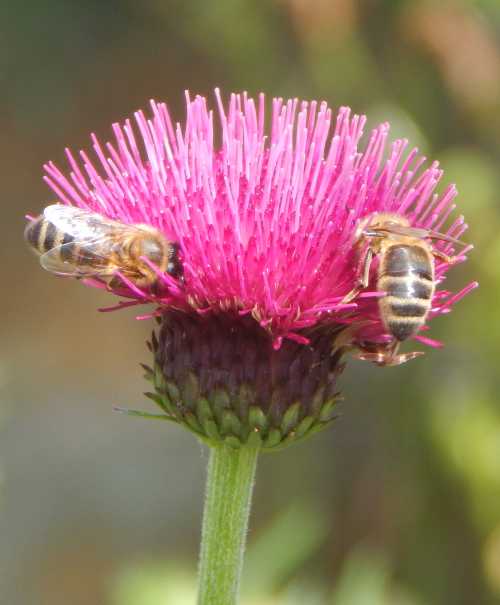Are Bees Fish In California?
If you've read my page 'What Are Bees?' you'll know that bees are insects, arthropods and invertebrates.
You may also have read that bees are not bugs or mammals - but what about 'fish', following a legal ruling in the USA?
Before you read any further, I want to make the firm point that bees are not fish in any recognized scientific animal classification system.
What appears to have happened in the case of bees being classified as 'fish' in California, is a decision by judges to allow the legal definition of a wildlife category (i.e. 'fish') to be broadened sufficiently to encompass other non-fish creatures, where no specific and suitable alternative category (i.e. 'insects') otherwise existed.
That judges have come to this decision enables the protection of rare bee species, as well as other insect invertebrates.
The process is explained simply and clearly in my video.
Why Judges In California Decided That Bees Can Be Fish
Probably due to agricultural practices, four species of bumble bee are in danger of extinction in California. Those species are:
- Crotch's Bumble Bee (Bombus crotchii);
- Franklin’s Bumble Bee (Bombus franklini);
- Western Bumble Bee (Bombus occidentalis); and
- Suckley’s Cuckoo Bee (Bombus suckleyi).
In 2019, the California Fish and Game Commission attempted to gain protection for these species under the California Endangered Species Act (CESA).
However, not surprisingly, they were met with opposition from the agricultural interests, such as the 'ALMOND ALLIANCE OF CALIFORNIA', who argued that under CESA, there was no provision for protection of insects, only "native species or subspecies of a bird, mammal, fish, amphibian, reptile, or plant".
The specific term 'insect' is not mentioned within the listed categories of protected wildlife.
How Bumble Bees Were Given Protection In California Under The 'Fish' Category
It looks to me that there were three key principals at work here that were used to extend protection to the endangered bumble bees in California.
1. The legal definition of a 'fish' in California
From West's Annotated California Codes. Fish and Game Code. Division 0.5. General Provisions and Definitions. Chapter 1. General Definitions:
§ 45. "Fish" defined
“Fish” means a wild fish, mollusk, crustacean, invertebrate, amphibian, or part, spawn, or ovum of any of those animals".
Note the word 'invertebrate' within the definition of 'fish'.
The judges stated that although the term 'fish' is in general, considered to refer to aquatic species, nevertheless, the term 'fish' can have a particular meaning within a legal context (in legal jargon 'a term of art' - which is a word having a particular meaning within a field).
This enabled the judges to interpret the term 'fish' broadly, rather than restrict the term 'fish' to mean 'only aquatic species'.
2. A precedent had already been set
Supporting the above assertion that the term 'fish' is a 'term of art' within a legal context, and includes more than just aquatic species, was the fact that other land-dwelling invertebrates had already gained protection under CESA's 'fish' category, including for example:
- Lange’s Metalmark Butterfly (Apodemia mormo langei);
- El Segundo Blue Butterfly (Euphilotes battoides allyni);
- Smith’s Blue Butterfly (Euphilotes enoptes smithi); and
- the Trinity Bristle Snail, (Monadenia setosa) - a medium-sized land snail.
3. Liberal definition of law
The judges stated that the protection already extended to the land snail under the fish category, supported a liberal definition of the term 'fish'.
They commented:
"The legislative history supports the liberal interpretation of the Act (the lens through which we are required to construe the Act)."
In summary
Although bees are insects, the use of the term 'fish' within a legal context is a 'word of art' that has been allowed to encompass a broad range of species.
As a result, the four threatened species of bumble bee can be given the protection they desperately need.
Resources
ALMOND ALLIANCE OF CALIFORNIA et al., Plaintiffs and Respondents, v. FISH AND GAME COMMISSION et al., Defendants and Appellants; XERCES SOCIETY FOR INVERTEBRATE CONSERVATION et al., C093542 (Super. Ct. No. 34201980003216CUWMGDS)
